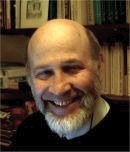|
Plenary
Lecture
Computations in Hyperbolic Spaces with
Surprising Applications

Professor Maurice Margenstern
University Paul Verlaine, Metz
UFR MIM, LITA, EA 3097
Ile du Saulcy
57045 METZ Ce'dex
FRANCE
E-mail:
margens@univ-metz.fr
Abstract: Computations in hyperbolic spaces are
difficult due to the group properties of these spaces
which make it difficult to use these tools, in sharp
contrast with the Euclidean situation.
The author devised a way to navigate in the
tessellations of the hyperbolic plane and one of the
four tessellations of the hyperbolic 3D space. This
constitutes an actual GPS which allows to know the
position of each tile with respect to the others and to
go from one tile to another one. From this, true
coordinates for the points of these spaces themselves
can be devised which have a nice behaviour undeer shifts
which preserve the tessellation.
In the talk, we sketchilly remind the Poincare''s disc
model which we use in order to try to see something in
these spaces. Then, we describe the coordinate system.
In the main part of the talk, we present and discuss the
wide range of its applications: this goes from cosmology
to computer science itself, including the Internet. We
shall look at already realized applications and at those
waiting for realization as well.
Brief Biography of the Speaker:
MARGENSTERN Maurice, born on June, 6, 1947, Paris,
France, married, 2 children, 1 grand-child, is full
professor at the University of Metz, IUT of Metz,
France, from 1995. Formerly, he was associated professor
at the department of mathematics of the University
Paris-Sud. He was the head of LITA (Laboratoire
d'Informatique The'orique et Applique'e), from 2000 up
to 2008 and an elected member of the scientific council
of his university from 2000 up to 2004. He was also the
head of the hiring committee of his university for
computer science from 1998 up to 2004. Recently, he was
promoted to the exceptional class for university
professors by the National Council of Universities in
France.
His scientific activity deals with the frontier between
decidability and undecidability which is studied in
various models of discrete computations. He has
important results in Turing machines, in cellular
automata and in (bio)molecular computing. He wrote 183
papers, among them 55 in well known international
journals, 48 in international conferences with
proceedings. He is a member of the Editorial Board of
the Journal of Universal Computer Science, of the
Journal of Cellular Auotmata and he is a member of the
Advisory Board of the Computer Science Journal of
Moldova. He is a member of WG 1.5 in the TC1 of IFIP.
He is very active in the field of cellular automata. He
introduced an original method in order to implement
these automata in hyperbolic spaces. This has very
interesting connections with elementary theory of
numbers and the theory of languages. It may also have
surprising applications. He published many papers on
this topic and a two-volumed book, "Cellular Automata in
Hyperbolic Spaces", an important scientific event. He is
also a contributor to Springer Encyclopedia of
Complexity and Systems Science.
Maurice Margenstern edited several special issues in
international journals of Computer Science: in
Theoretical Computer Science, in Fundamenta Informaticae
and a new issue is currently planned for the
International Journal of Foundations of Computer
Science.
Maurice Margenstern organised a cycle of conferences,
called "Machines, Computations and Universality", MCU-conferences,
which hold each third year starting from 1995. Each
edition of the conference is followed by a special issue
of a well know journal: TCS for the first three
editions, FI for the fourth and fifth editions
(Saint-Petersburg, 2004 and Orle'ans, 2007). The sixth
edition is to be held at Pittsburgh, USA, in September,
21-25, 2010. The proceedings will be published in EPTCS
and a special issue of IJFCS will follow the conference,
devoted to its topics.
|
